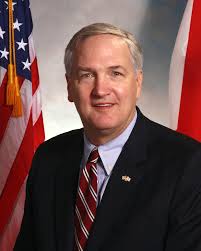“As attorney general, it is my duty to uphold Alabama law, including the laws against illegal gambling. Daily fantasy sports operators claim that they operate legally under  Alabama law. However, paid daily fantasy sports contests are in fact illegal gambling under Alabama law.” With those words, Alabama Attorney General Luther Strange told DraftKings and FanDuel to get out of his state, effective May 1. However, it may not be a lengthy setback: A bill before the legislature would “establish the Fantasy Contests Act to regulate the operation of fantasy or simulated contests in the state.” While Strange’s opinion is a binding one, Tennessee Attorney General Howard Slattery‘s similar opinion was merely advisory.
Alabama law. However, paid daily fantasy sports contests are in fact illegal gambling under Alabama law.” With those words, Alabama Attorney General Luther Strange told DraftKings and FanDuel to get out of his state, effective May 1. However, it may not be a lengthy setback: A bill before the legislature would “establish the Fantasy Contests Act to regulate the operation of fantasy or simulated contests in the state.” While Strange’s opinion is a binding one, Tennessee Attorney General Howard Slattery‘s similar opinion was merely advisory.
At the behest of House Minority Leader Rep. Craig Fitzhugh, who is looking for guidance on DFS’ legality, Slattery wrote,“While participants may use skill to select players for their teams, winning a fantasy sports contest is contingent to some degree on chance. Namely, the participants do not control how selected athletes perform in actuality on a given day. Athletes’ performances are affected by many fortuitous factors – weather, facilities, referees, injuries, etc. Thus, absent legislation specifically exempting fantasy sports contests from the definition of ‘gambling,’ these contests constitute illegal gambling under Tennessee law because they’re all predicated on an exchange of money, even though many sites offer fantasy sports leagues at no cost.”
Pro-DFS legislation continues to crawl through the legislatures of, among other states, Illinois, Missouri, Maryland and Colorado. However, adjournment looms in several of those states, threatening to leave DFS in limbo until lawmakers reconvene in the fall … most inconvenient for DFS sites, which should be seeing some of their heaviest action about that time.
Already, casinos like MGM Resorts International‘s Mandalay Bay and the Downtown Grand are looking past DFS and coveting e-sports tournaments, presuming that they can find a way to monetize the action. The spectator sport is estimated to a business in excess of $5 billion. Flower City Gaming‘s Seth Young said that, unlike e-sports, DFS had lost the argument on whether it’s gambling or not, while William Hill US CEO Joe Asher said his company has no interest in DFS, arguing that the only people making money off it were the networks who cleaned up on FanDuel’s and DraftKing’s advertising blitzkriegs last autumn.
* Steve Wynn doesn’t mince words, regardless of who’s on the chopping block. He fired off a blast at life’s less-fortunate souls during a recent meeting with investors. Wynn said, “This company caters to the top end of the gaming world. We’re sort of a Chanel, Louis Vuitton to use the comparison  the metaphor of the retail business. But unlike Chanel and Louis Vuitton, we are able in our business to cater to all of the market by making our standard so high that everybody wants to [be] in the building. Or to put it in a more colloquial way, rich people only like being around rich people, nobody likes being around poor people — especially poor people.” We don’t find any fault with Wynn’s retail analogy but he’s in no danger of having to be around poor people, save for the view through the tinted windows of his limousine as it whisks him from his Wynncore villa to Wynn Resorts‘ corporate jet. And, come to think of it, when he tried to build a casino near and for rich people, in Massachusetts, the local citizenry chased him off.
the metaphor of the retail business. But unlike Chanel and Louis Vuitton, we are able in our business to cater to all of the market by making our standard so high that everybody wants to [be] in the building. Or to put it in a more colloquial way, rich people only like being around rich people, nobody likes being around poor people — especially poor people.” We don’t find any fault with Wynn’s retail analogy but he’s in no danger of having to be around poor people, save for the view through the tinted windows of his limousine as it whisks him from his Wynncore villa to Wynn Resorts‘ corporate jet. And, come to think of it, when he tried to build a casino near and for rich people, in Massachusetts, the local citizenry chased him off.
* A contrary school of thought holds that casinos are strictly for poor people, sucked into a 100-mile-radius event horizon, their money never to be seen again.
* As for casinos for wealthy people, our resident sleuth and Webmistress has uncovered the etymology of James Packer‘s Alon. It’s Australian slang for Alcoholics Anonymous. Now there’s a cheery thought.
* While Atlantic City improvises its way from one fiscal solution to another, Assembly Speaker Vincent Prieto (D) and Gov. Chris Christie (R) are at a Mexican standoff, with the Boardwalk caught in the middle. Prieto has devised an alternative bill to Christie’s state takeover of Atlantic City. It would forestall a takeover until and unless Atlantic City  failed to meet certain financial goals. Most importantly for Prieto, it would delay for a couple of years the state’s ability to abrogate collective-bargaining agreements with the city. “Collective bargaining and worker rights cannot be the first thing on the chopping block,” said Prieto, prompting Christie to dismiss the bill as a “union-protection plan.” The battle is getting nasty, with Christie calling Atlantic City Mayor Don Guardian a liar for first supporting, then opposing the state takeover. As for Prieto, “this is the most irresponsible game of political chicken I’ve ever seen,” said the governor.
failed to meet certain financial goals. Most importantly for Prieto, it would delay for a couple of years the state’s ability to abrogate collective-bargaining agreements with the city. “Collective bargaining and worker rights cannot be the first thing on the chopping block,” said Prieto, prompting Christie to dismiss the bill as a “union-protection plan.” The battle is getting nasty, with Christie calling Atlantic City Mayor Don Guardian a liar for first supporting, then opposing the state takeover. As for Prieto, “this is the most irresponsible game of political chicken I’ve ever seen,” said the governor.
The latter is also suing Atlantic City to compel it to channel property-tax money to its schools, not use it to prop up government operations. The teacher’ union — its contracts shielded in the state Senate’s takeover plan (the one Christie supports) — applauded the governor’s move. The bottom line is that things in Atlantic City appear certain to get very much worse before they get better, especially with Guardian having been found in default of property-tax repayments to Borgata, which stands to collect $62 million under the most recent court order. Showing that two can play that game, Borgata is withholding its tax payments to the city, as a means of reimbursing itself as it were.

